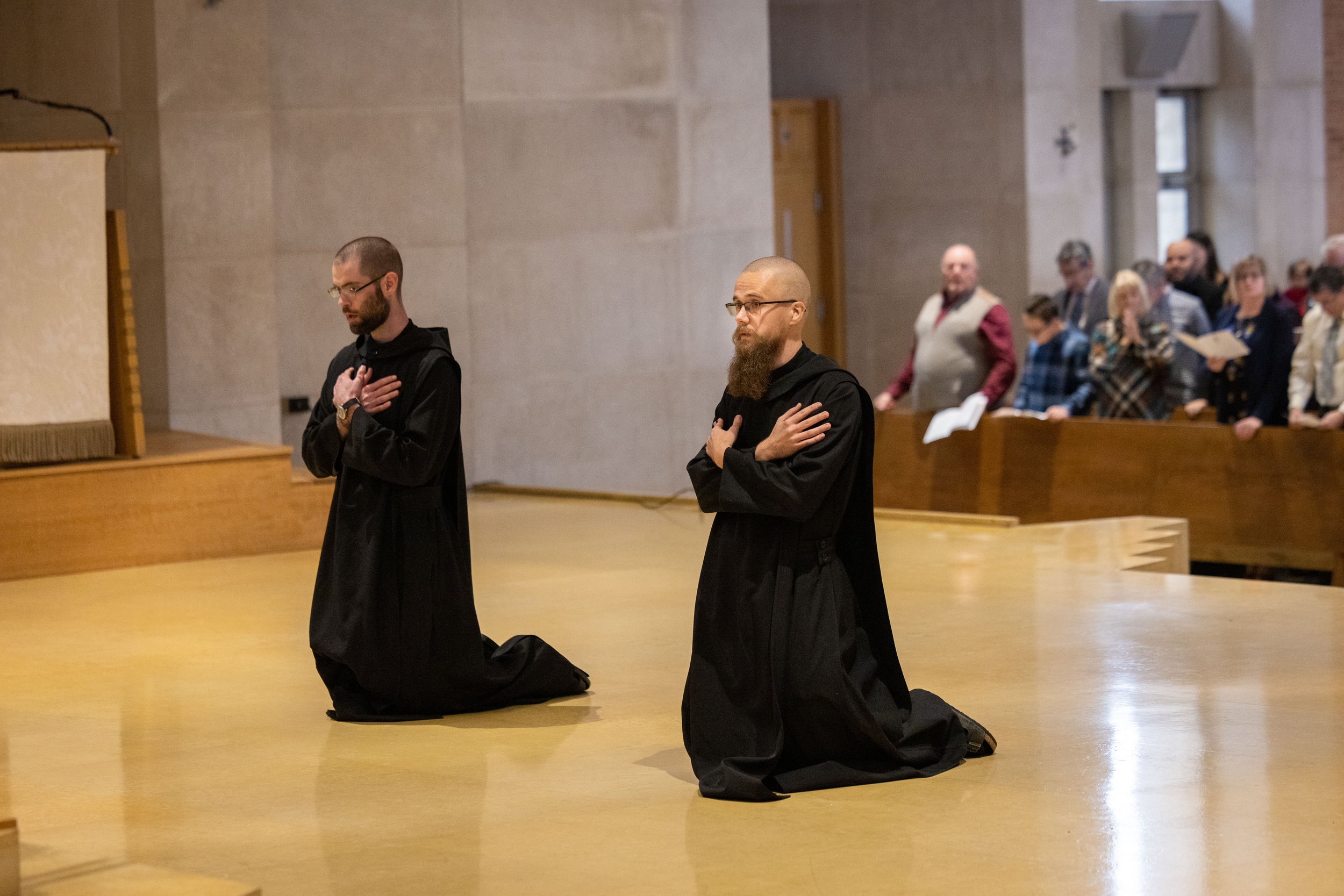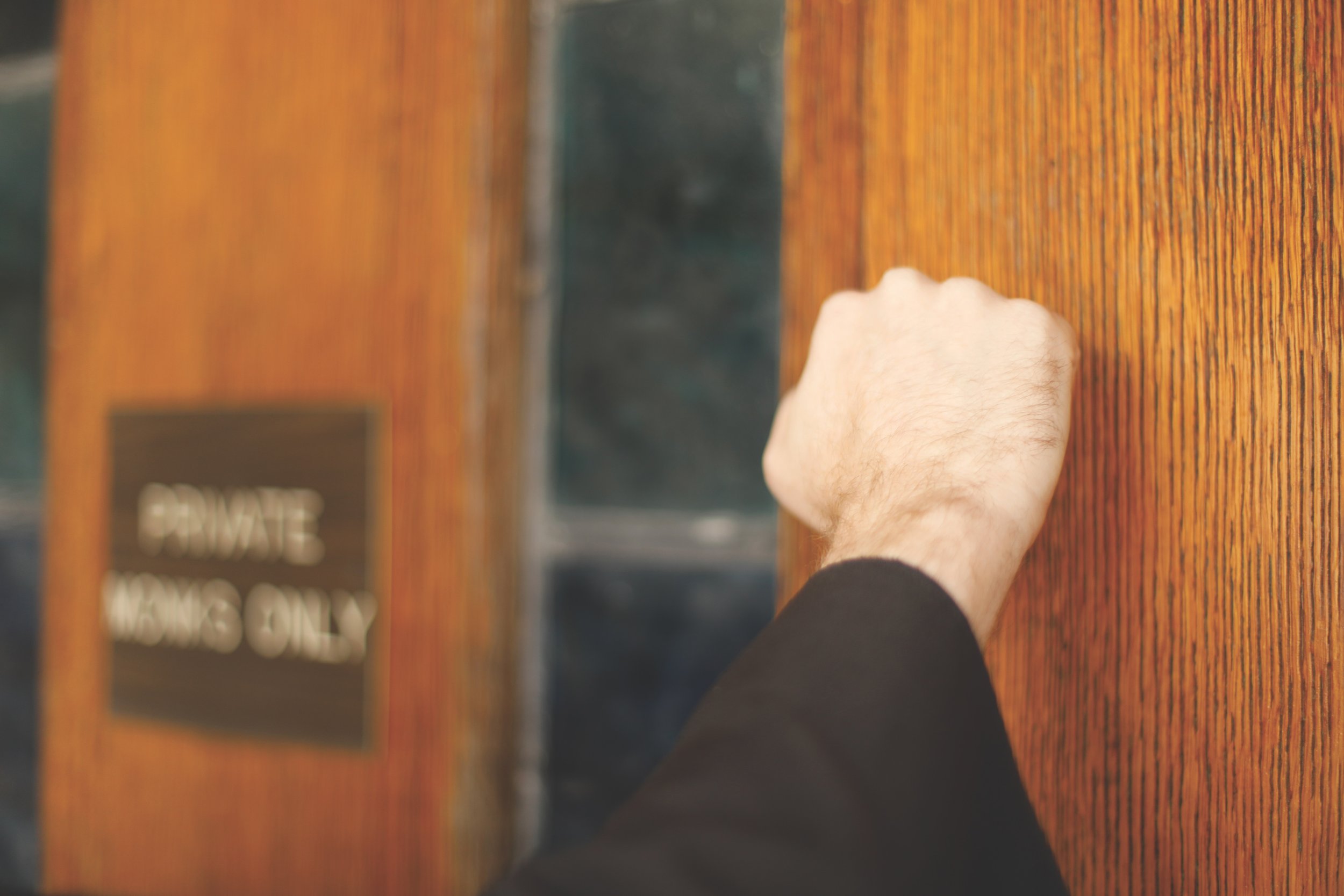
stages of formation
We can all remember the significant milestones in our lives, from our First Communion to our first car - monastic life is no different. As the monk progresses through the formation process toward the lifetime commitment at solemn profession, there are various stages of monastic life, each unique and important.
postulancy
It starts with a knock at the door - after completing an application process, the men who wish to begin monastic formation gather on the porch behind the monastery and knock at the door. As they enter they are greeted by the Abbot and the vocations director with the monastic community waiting in the hallway behind them. As they are accepted into the community, they are led to their choir stalls in the abbey church.
The Postulancy is a transition from one's past life and the beginning of a new path, under the guidance of the Postulant Director. For four months the postulants wear cassocks and live in the monastic cloister. As they take the first steps toward integrating themselves in the monastic community they take on work assignments in and around the abbey, working the grounds and assisting with internal tasks. They also begin the formation process by taking classes from other members of the monastic community on a variety of topics from prayer and discernment to monastic history.
novitiate
Upon completing the postulancy, the candidate may apply to enter the novitiate. With his acceptance by the monastic community, he comes before the Abbot during Vespers and is invested in the monastic habit. The Abbot then announces to the novice and community the novice's monastic name, and he receives the Rule under which he will live. With this the novice leaves his identity behind, forsaking his clothing and name in favor of the monastic habit and name. The novitiate year immerses the novice in prayer and study of various topics (monastic charism, the Psalms, spiritual theology, etc.) Having no formal assignment, the novice is free from the onus of any type of consuming job and is given the structure to pray intensely, study monastic and theological topics, and offer himself generously to the fraternal life. Discernment of a very intentional nature is required during this time as well, for the young man considers whether or not to apply for First Vows.
juniorate
Upon completing the novitiate year, the novice can then apply to profess triennial, first vows. If he is accepted by the monastic community, with the permission of the Abbot and recommendation of his Novice Master, the novice comes before the Abbot and community at Mass and professes the monastic vows of Stability, Conversion through a monastic way of life, and Obedience. He then receives the monastic hood - the helmet of Christ.
These vows are temporary, binding for three years. During this period, the monk will begin to have official assignments. Under the direction of the Junior Master, the monk begins to live with responsibilities that contribute to the life of the monastic community. He is often introduced to the work of our apostolates. At the conclusion of the three years, another momentous discernment arises: to apply to profess Solemn Vows, to request an extension of Simple Vows, or to leave the community.
solemn vows
At the conclusion of First Vows the monk can then apply to make a lifelong commitment to monastic life by professing Solemn Vows. The monk lies prostrate before the altar and is covered by the funeral pall symbolizing the death of his self and the surrendering of his will to God; the same funeral pall will be draped over his coffin at his Mass of Christian Burial. The monk now has full rights as a member of the monastic chapter and will serve in whatever capacity the abbot deems appropriate to his skills and the community's needs.
ordination
If the monk has discerned a call to the priesthood he will begin studying theology and philosophy at Benedictine College. Upon completing the prerequisites for major seminary, he will spend four years living apart from the community at a Benedictine abbey with a seminary attached. Upon ordination he will serve in our educational or parish apostolates, or in a position of service within the community.
brotherhood
Not all of the monks are called to the priesthood, but they serve the community in a variety of ways. According to the monk's talents he may be assigned to serve in our educational apostolates as a member of the faculty or staff, or he may be assigned to a position of service within the monastery itself - for more on that, see the Day in the Life page.




